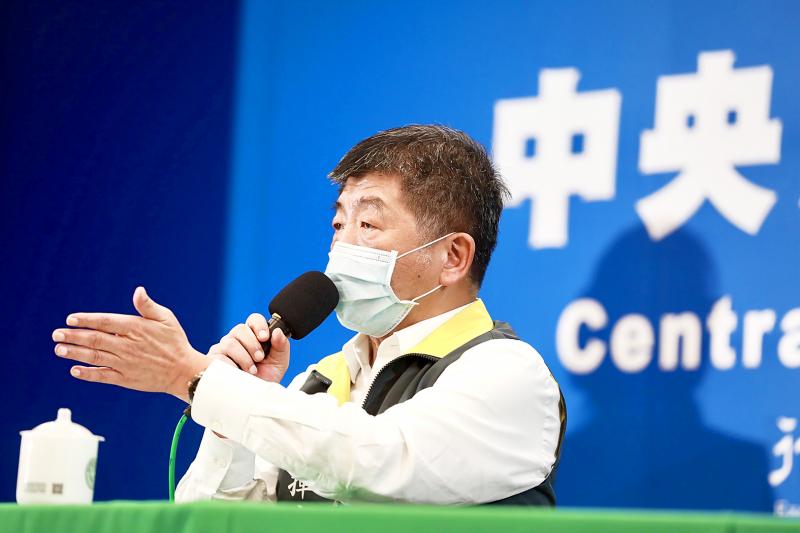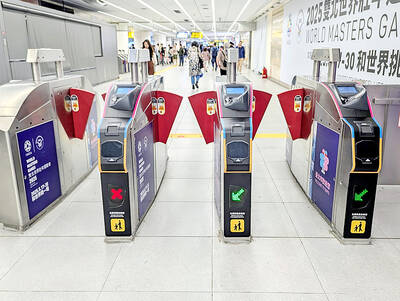The three biggest COVID-19 challenges the Central Epidemic Command Center (CECC) has faced were stabilizing mask supplies, border controls for people arriving from Europe or the US, and the cluster infection on the Panshih (磐石) navy supply ship, Minister of Health and Welfare Chen Shih-chung (陳時中) said yesterday.
Chen, who heads the center, told an international news conference organized by the Ministry of Foreign Affairs in Taipei on Wednesday that the three disease-prevention areas were the ones that could be improved the most.
He made the same remarks at the CECC’s news briefing yesterday.

Photo: CNA
The mask shortage in January and February caused by panic buying as the outbreak escalated over the Lunar New Year holiday caught the center off guard, he said, adding that it had to release masks reserved by the government for emergency purposes to meet demand.
Inventory replenishment could not be achieved amid the holidays, when production was halted, he said.
The center on Feb. 6 rolled out a mask-rationing system, which limited the number people could buy to two per week, he said.
With rationing and enhanced production, it took about a month before supplies stabilized, he said, adding that supply has remained ahead of demand since.
The second challenge was to stop imported COVID-19 cases from Europe and the US, where infections rose “abruptly” and “exponentially,” Chen said.
Although the center had anticipated a rapid increase in COVID-19 cases in Europe, it did not predict that the escalation would be as soon as early March, prompting it to place an abrupt entry ban on foreigners from March 14, he said.
The sudden decision inconvenienced some travelers, he said.
Taiwanese who returned from European nations not previously subject to quarantine rules were ordered to do so to minimize the risk of community infection, he said.
Some of those people tested positive for the novel coronavirus, but thanks to their full cooperation, the “loopholes” were closed, he said.
The Panshih situation was the third challenge, Chen said.
The vessel was one of three in a “Friendship Flotilla” that visited Palau from March 12 to 15, with several navy cadets found to have contracted COVID-19, but they were only ordered into quarantine after they had disembarked.
As of Tuesday, 36 military personnel aboard the ship had tested positive for the virus.
A lack of sophisticated diagnostic equipment was why doctors onboard failed to promptly diagnose the infections, Chen said.
New equipment has been added to military vessels to prevent a recurrence, he said.

A magnitude 6.4 earthquake struck off the coast of Hualien County in eastern Taiwan at 7pm yesterday, the Central Weather Administration (CWA) said. The epicenter of the temblor was at sea, about 69.9km south of Hualien County Hall, at a depth of 30.9km, it said. There were no immediate reports of damage resulting from the quake. The earthquake’s intensity, which gauges the actual effect of a temblor, was highest in Taitung County’s Changbin Township (長濱), where it measured 5 on Taiwan’s seven-tier intensity scale. The quake also measured an intensity of 4 in Hualien, Nantou, Chiayi, Yunlin, Changhua and Miaoli counties, as well as

Credit departments of farmers’ and fishers’ associations blocked a total of more than NT$180 million (US$6.01 million) from being lost to scams last year, National Police Agency (NPA) data showed. The Agricultural Finance Agency (AFA) said last week that staff of farmers’ and fishers’ associations’ credit departments are required to implement fraud prevention measures when they serve clients at the counter. They would ask clients about personal financial management activities whenever they suspect there might be a fraud situation, and would immediately report the incident to local authorities, which would send police officers to the site to help, it said. NPA data showed

ENERGY RESILIENCE: Although Alaska is open for investments, Taiwan is sourcing its gas from the Middle East, and the sea routes carry risks, Ho Cheng-hui said US government officials’ high-profile reception of a Taiwanese representative at the Alaska Sustainable Energy Conference indicated the emergence of an Indo-Pacific energy resilience alliance, an academic said. Presidential Office Secretary-General Pan Men-an (潘孟安) attended the conference in Alaska on Thursday last week at the invitation of the US government. Pan visited oil and gas facilities with senior US officials, including US Secretary of the Interior Doug Burgum, US Secretary of Energy Chris Wright, Alaska Governor Mike Dunleavy and US Senator Daniel Sullivan. Pan attending the conference on behalf of President William Lai (賴清德) shows a significant elevation in diplomatic representation,

The Taipei MRT is to begin accepting mobile payment services in the fall, Taipei Rapid Transit Corp said on Saturday. When the company finishes the installation of new payment units at ticketing gates in October, MRT passengers can use credit cards, Apple Pay, Google Pay and Samsung Pay, the operator said. In addition, the MRT would also provide QR payment codes — which would be compatible with Line Pay, Jkopay, iPass Money, PXPay Plus, EasyWallet, iCash Pay, Taiwan Pay and Taishin Pay — to access the railway system. Currently, passengers can access the Taipei MRT by buying a single-journey token or using EasyCard,